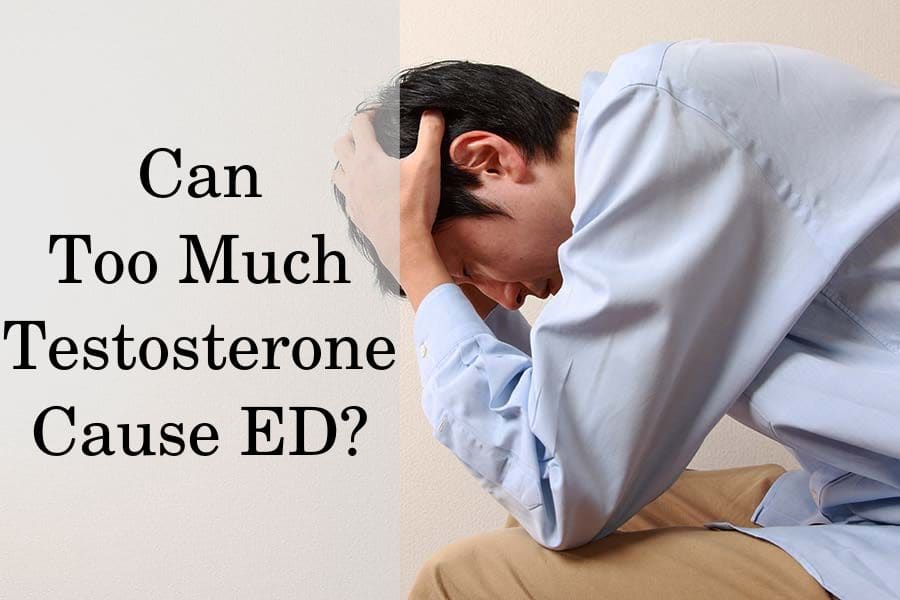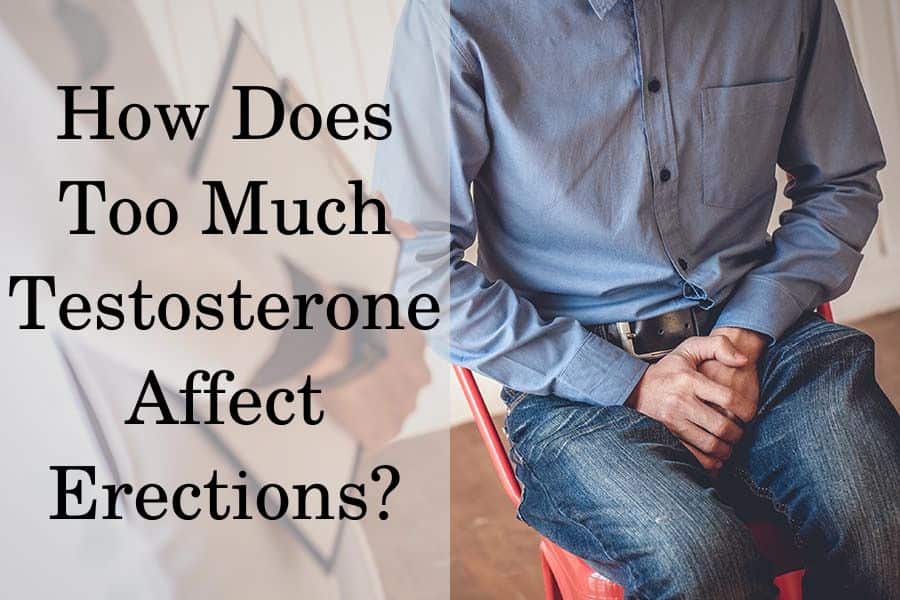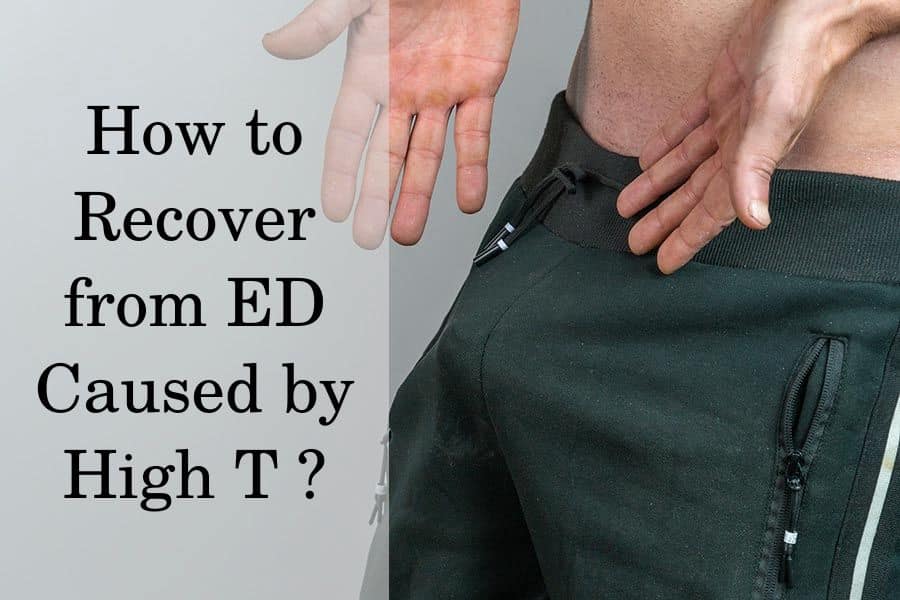Many people assume that erectile dysfunction (ED) is solely related to low testosterone (T) levels. However, it’s important to note that having too much testosterone can also have negative effects on sexual well-being and erections.
Testosterone excess is defined as serum T levels that significantly exceed the upper limit of the reference range. Such levels are termed supraphysiological and can lead to an increase in estrogen levels leading to a hormonal imbalance.
It’s important to note that naturally high T levels rarely exceed 1000 ng/dL and do not have such negative effects.
However, exogenous testosterone can lead to too high T levels, which leads to elevated estrogen, suppression of the function of the testes, and increased risk of sexual dysfunction.
What does too much testosterone do to erections?
Too much testosterone can be converted into estrogen, which negatively affects male erections. Studies show estrogen levels in men tend to be higher in those with ED compared to healthy males, even when the T levels of the two groups are similar.
On the other hand, a lack of testosterone can also impair erections and lead to ED. In fact, erections are an androgen-dependent process, and at least small amounts of testosterone are essential for normal erectile function.
That’s because testosterone is the main activator of the enzyme nitric oxide synthase, which produces the nitric oxide (NO) required for achieving an erection. NO works by activating the synthesis of another molecule called cGMP.
cGMP then binds to and activates protein kinase G (PKG), which causes the relaxation of smooth muscle cells in the blood vessels of the penis, leading to increased blood flow and erection.
Interestingly, testosterone also activates another enzyme called cGMP-specific phosphodiesterase type 5 (PDE5). The function of PDE5 is to degrade cGMP, which returns the smooth muscle cells to their contracted state, leading to a reduction in blood flow.
Thus, testosterone regulates both the initiation and the end of an erection.
ED may also occur due to cardiovascular problems, metabolic diseases, psychological and neurological conditions, and certain medications
Regardless of the cause, it usually manifests with an inability to achieve or maintain an erection despite the presence of sexual stimuli. Lack of morning erections may also be a sign of ED, but it’s not a reliable indicator of your T levels.
Despite the fact that the peak in daily testosterone levels coincides with the occurrence of morning erections, most scientists believe that the increase in blood flow during REM sleep, which predominates in the morning, plays a more significant role.
Furthermore, the fullness of the bladder and the rectum during sleep also stimulates the nerves in the pelvic area, leading to an erection.
Other symptoms of high T that affect sexual wellness
Apart from increasing estrogen levels, excessively high testosterone levels may also lead to other problems that can have negative effects on sexual health.
For example, it may worsen benign prostate hyperplasia (BPH), which is a non-cancerous enlargement of the prostate gland. The gland is located near the base of the penis and surrounds the urethra, so BPH can put pressure on the urethra and interfere with the normal flow of urine and semen.
The condition results in lower urinary tract symptoms which can interfere with the normal sexual function of men. Furthermore, some of the side effects of the medication used to treat BPH include erectile dysfunction and reduced libido.
While normal T levels are essential for the normal function of the heart, excessively high androgens can have several negative effects on the cardiovascular system, such as enlarged heart and endothelial dysfunction.
Endothelial dysfunction and erectile dysfunction are closely linked, as endothelial cells line the inner walls of blood vessels, including those in the penis. These cells play a crucial role in regulating blood flow and maintaining vascular health.
When the endothelial function is impaired, blood vessels are less able to dilate and respond to changes in blood flow, leading to reduced blood flow to the penis and a decreased ability to achieve and maintain an erection.
Can TRT cause ED?
When used properly and under medical supervision to achieve physiological serum testosterone levels, testosterone therapy has not been shown to cause ED.
In fact, TRT (testosterone replacement therapy) may improve erectile function in some men who have low T levels and related symptoms, such as decreased libido and energy levels.
However, it is important to note that testosterone treatment may not be the appropriate treatment for all cases of ED, as there are many potential causes of this condition.
Furthermore, improper use of TRT or use without medical supervision can potentially increase the risk of side effects, including ED.
This can happen when taking excessive doses of exogenous testosterone because the aromatase enzyme will start converting more testosterone into estrogen, resulting in elevated estrogen levels.
Studies conducted on animals have demonstrated that increased levels of estrogen can result in erectile dysfunction even during TRT, which achieves normal or high testosterone levels.
Any form of testosterone therapy can result in supraphysiological levels of serum testosterone if not dosed properly. This includes the most preferred and commonly prescribed form of TRT – testosterone injections.
Dosages in excess of the doctor’s recommendations can lead to supraphysiological serum T levels, which increase the risk of side effects
Regardless of the form, high doses of TRT can suppress natural testosterone production, which further increases the occurrence of ED after cessation of exogenous testosterone.
Studies suggest that individuals who abuse large doses of testosterone or anabolic steroids often take medications for ED, such as PDE5 inhibitors, in order to combat the condition.
TRT can be safely combined with PDE5 inhibitors to manage ED, as there are no potentially harmful interactions between the two therapies. Some of the most popular PDE5 inhibitors are Sildenafil (brand name Viagra), Tadalafil (Cialis), Vardenafil (Levitra), and Avanafil (Stendra).
How to avoid erectile dysfunction on TRT
It is crucial to work closely with a healthcare provider when considering testosterone treatment for low T levels or related symptoms and to closely monitor the effects of TRT on erectile function and overall health.
If you experience side effects such as ED, your healthcare provider may consider reducing the dosage of TRT. A healthcare provider may also adjust the dosage of your TRT based on your individual response to the treatment, blood testosterone levels, and other factors such as age, weight, and medical history.
Even if testosterone therapy did not have any negative impact on your erections, you would be at a higher risk of developing ED once you discontinue it. That’s because TRT suppresses the normal function of the testes and natural T synthesis.
Thus, it will take some time before that natural T production as well as the erectile function, returns back to normal after stopping TRT. The time it takes will vary from one individual to another, depending on age, presence of diseases, duration of the therapy, etc.
Currently, there aren’t any studies investigating how quickly erectile function recovers post-therapy. However, some trials suggest that spermatogenesis, which also depends on testosterone levels, recovers within 6-8 months of discontinuing a 12-month TRT.
Best treatments for ED
Certain medications may help reduce or avoid the risk of ED during and after testosterone therapy. Studies show that estrogen-modulating therapies which involve selective estrogen receptor modulators (SERMs) can have a protective effect in maintaining erectile function.
The scientists share that SERMs can exert partial estrogen receptor agonist activity, which helps prevent the negative effects of estrogen on erections without blocking any of its physiological effects on sexual function.
It is uncertain if other anti-estrogens, such as aromatase inhibitors, can also help prevent ED because they may also inhibit some of the physiological effects of estrogen on sexual function.
Some may also prefer natural options to improve their erections rather than adding more medications to TRT. However, it’s important to note that the effects of dietary supplements are relatively minor and uncertain.
Studies show that dietary ingredients such as Panax Ginseng, Saffron, Tribulus Terrestris, and L-carnitine may lead to a slight improvement in erectile function. However, it’s important to note that neither of these supplements can increase or decrease serum testosterone levels.
Get a free consultation with our medical expert for any questions about hormone replacement therapy



